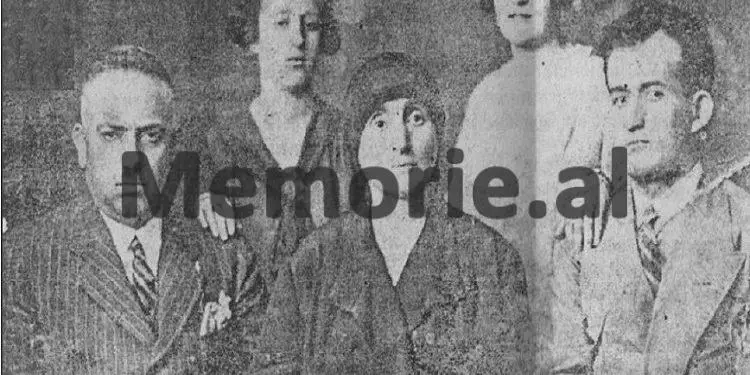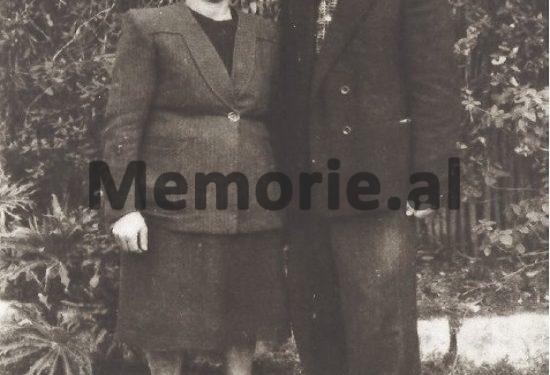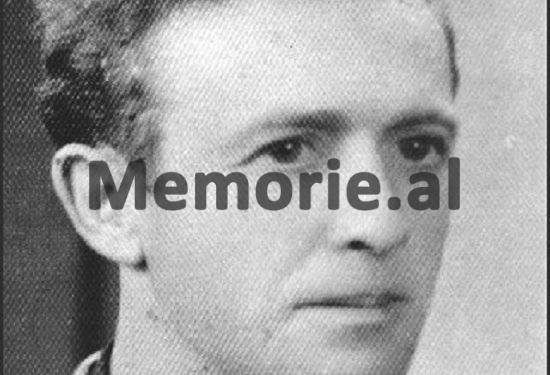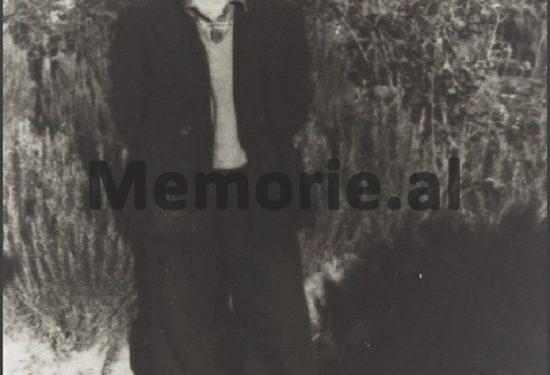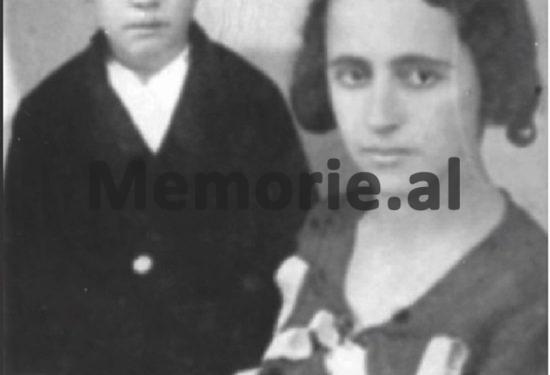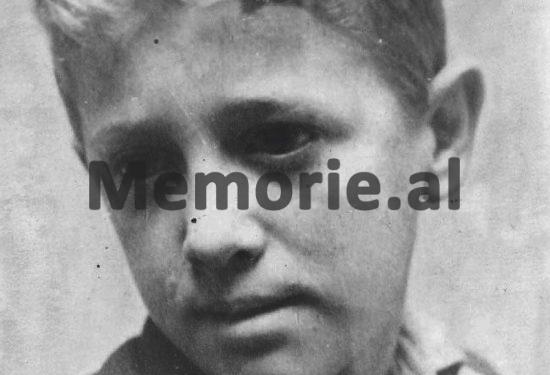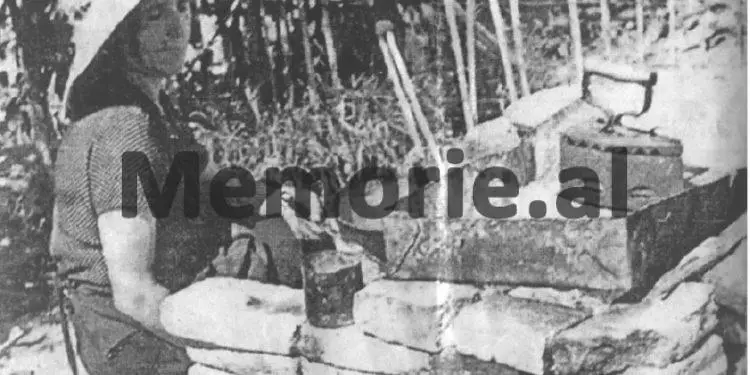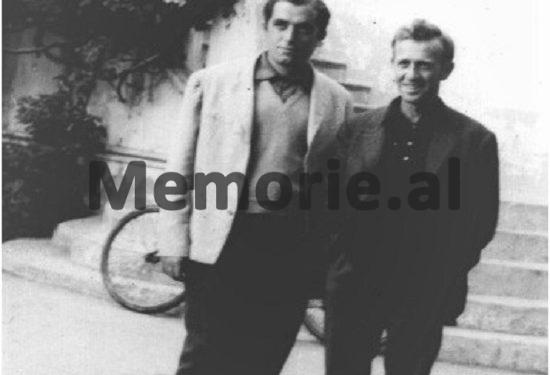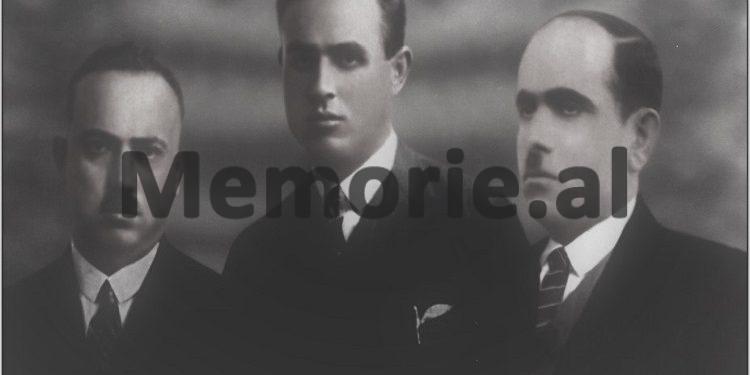Fatbardha Mulleti (Saraçi)
Part Twenty
Memorie.al publishes some parts from the book ‘Calvary of women in communist prisons’, by Fatbardha Mulleti Saraçi, (granddaughter of the famous former mayor of Tirana, Qazim Mulleti), whose family from 1944 until in 1991, he was persecuted by the communist regime of Enver Hoxha, where Fatbardha’s father, Haki Mulleti, a former senior state administration official since the 1920s, was imprisoned and interned by his family, until died in the hospital of Tirana, poisoned by the State Security. In her book ‘The Calvary of Women in Communist Prisons’, which is the fruit of several years of work, the author has masterfully described the unknown stories of some of the Albanian women and girls who suffered in prisons and internments in the dictatorial regime of Enver Hoxha, started by her mother, Pertefe Mulleti, and many others.
In addition to the above, the author Fatbardha Mulleti Saraçi, in her book, has described some of the tragic stories of some well-known families, mainly from Northern Albania (but also from Central and Southern Albania) such as; Gjonmarkaj of Orosh of Mirdita, Dine, Dema, Kaloshi, Ndreu, of Dibra, Pervizët from Skuraj of Kurbin, Miraka of Puka, Kola of Mat, Bushati, Pipa, Dërguti, Serreqi, Naraçi, Saraçi, Marashi, Gurakuqi, Çoba, Malaj , Vata, Deda, Vuksani, Kaçaj, Luli, Sokoli, Mushani, etc., of Shkodra and Malsisë e Madhe, Kupi, Merlika, of Kruja, Kërçiku, Mulleti of Tirana, Staravecka of Skrapar, etc., which were persecuted and were massacred in the most barbaric way by the communist regime of Enver Hoxha, parts of which will be published in the continuation of this cycle of articles by Memorie.al
Continued from the previous issue
Memories from hell
(by Fatbardha Biçaku-Çelepe)
When I was three years old, my father put me in jail. The mother was dressed in black. The bag on the arm and me by the hand, we knocked from South to North, in many prisons and extermination camps, to help a little and to shake hands through barbed wire with our loved ones. With my bare hands I embroidered the dowry for a door and a chimney. I got engaged and said to myself that my life would change a little. But here is the wedding: cooking bread with tears, taxi starting with tears. Fingers painted with honey, I expected to touch the door, but the husband’s house had no door. People came in and out of the window like in beehives. The barracks was without light and without chimney, without door and without ceiling. My husband and I shook hands, looked at the barracks, and our minds wandered to the houses that had been burned by communism.
Many ladies came in and out of the window to congratulate, as if they represented the entire Albanian cream. The mother-in-law, sitting on a bench, got up and introduced me to her friends, former young brides, who remained faithful to the death of their husbands, even though they were not near them, nor did they shake hands. One of these ladies said to me: “Welcome my bride! How did you get the name, good luck”! The tyrannical accent of this lady, made me ask the man. He replied: “It is Hajrija’s mother, Qazim Mullet’s wife, she is a woman, and we are on the threshold”. There was so much noise that it was not known whether they were wedding guests or neighbors’ voices, crying or laughing, as if they were in the same room. This was our wedding. Covered under the quilt, we silently expressed our love for each other.
The next day, mother-in-law and Mrs. Hajrie drank coffee in a hut, with sticks and paper bags that the husband had made for his mother. There was a bed with a mattress (swamp feathers). A small stove and two-three benches. I watched and wondered how the communists had laughed at such a good and courageous lady. I learned a lot from her. Her pain was like that of all our mothers, but she was hurt from time to time, on radio and television, and whenever she felt the pain, she scolded her, remembering her husband’s words: “You have to without who communism is.”Once he has done business with us (shot, imprisoned and interned ‘reactionary’ families), they will now eat each other’s heads and tear each other apart.”
We lived together a lot and I keep many memories of her, because with mother Hajrien, we had no key to the door or thoughts. My husband played chess with Reshit (Hajria’s son) and my children had three grandmothers. And grandmother Hajri was closer, as the others had not retired. The other women in the dark came out of the house and in the dark came home. I, like everyone else, dug the ground all day and spent the whole night washing, cooking, teaching, and preparing our children for work and school. And when we received two ALL, for 10 hours of waiting, mother Hajria gave us courage and said: “When we did not die in Tepelena, we will never die of hunger”.
He had another language with the rulers and made fun of them a lot. One day, the person in charge, with his head as big as a pig and his belly as big as a pig, says to the lady: “Did you see Qazim… what a man he was”. The lady looks at him angrily and says: “This is how your wife was, not like you, when the smell of cow dung and pork comes to you”! A party secretary, who wanted to make fun of Hajri, when he said: “Did you laugh with Qazim, when you saw him last night on television”? She replied: “I laughed a lot with you, when I saw your mother in the cowshed of you, licking behind the snouts of the sheep. You curse and make fun of Roosevelt and Churchill and I do not regret that we are on Churchill and Roosevelt’s side. “You yourself have sided with them.”
Another day, senior Party and local government leaders were gathering to take us into action. Mother Hajria came late. The senior party member says: “Come on, my Hajrie, because you are no longer in the time of Qazim Mullet”. She replied with the utmost calmness: “He is taking his goods to me. The car was waiting for you and your car was waiting for you. He was waiting for your people to wait for people. He fat and you fat. “But you have to wear high heels, because you are too short.” The jokes and answers were very quick.
One day off us drink coffee at her house. She took pictures of me and explained at length about each one. There I learned the truth of the Mulleti family. Mrs. Hajrie was proud to have descended from a family of patriots (of the Kus) and to have become a bride, to the Mullets, and had no regrets that her happiness was so short-lived. She had lived with her husband for a total of 6 years. Once, when I was returning from the meeting I had with the soldier man, he asked me: “Hey, bride, how do you leave your husband”? I said, “Okay, but my daughter did not know him.” “Why?” – told me. “The tunnels were very tired,” I replied.
“In our time, the soldier served the homeland, and now, since they have broken with God, they make graves prematurely.” – He laughed so much that I had never seen him, and then he said to me: “Not to enter the tunnel, but also to enter the ox horn, God will take revenge on them”.
The days passed and the newspapers wrote daily. This state rotted. This continent was destroyed. Mother Hajria laughed, saying: “They have gone to the moon and are going to Mars, and we are proud of plucking leeks.” We heard that a milkmaid, a brigadier and a coachman have become ministers. I asked mother Hajri: “But where did they find all these minds”? She, with a laugh, said: “For the first to the cow’s butt, for the second, to the pig’s butt, to the third, to the horses butt. Now they will be destroyed and have nowhere to go, as far as China and Brazil. “Now the world will make fun of us.”
One night we came to watch the comedy “The Prefect” together. When we parted, he kissed the children and said, “Laugh today and write tomorrow.” She had faced torture and pressure from investigative executioners. The heads of the State Security, including Halim Xheloja, Nuçi Tira, Gjysh Tafili, Skënder Kosova and others, had also dealt with him. When they took him to Tepelena, the camp commander told him: “Come on, my wife, the mayor, because we have been waiting for you for two months. “You stayed in your palaces for a long time.” Hajria had replied: “You drove us out of the houses you entered. The people saw nothing but nothing, with all the beautiful promises you made. You have done great bravery. Governments do not deal with children, women, the elderly. “You have filled the camp with old people, women and children.”
“If you have a long tongue,” said the commander, “we will wait for it.” She told him: “Open the conversation yourself. You beat and do not leave me crying. “The previous governments did not deal with old men and women, they only dealt with politicians.” The women of the Tepelena camp had also been taken to the railway.
From the life of Qazim Mullet’s wife
Many mothers, wives, daughters, children and the elderly were exiled just because their sons, husbands, brothers and fathers were unwelcome by the communist regime, were political prisoners and the Slavo-communist state denied them the most basic thing, freedom . By denying them freedom, they were isolated from the rest of society and were not allowed to return to their homeland, close to their relatives. This was denied to him for years, while for many families it continued for several decades.
Your heart aches when you think of how many honorable ladies, precious mothers, who experienced suffering in internment camps such as Tepelena, Savër, Gradisht, etc .., who were young, grew old and some of them died there. Here are some of them: Rukije Dine, Meleqe Dine, Sultane Dine, Vesfie Dema, Mudi Dema, Mrika Gjon Markaj, Marta Markagjoni, Vashe Kola, Hajrie Cami, Cuba Miraka, Kune Miraka, Caje Merlika, Lice Kaloshi, Bije Kaloshi, Lije Ndreu , Rufije Ndreu, Ilmije Agolli, Zeqine Agolli, Roza Marashi, Ana Pervizi and Hajrie Mulleti.
I am stopping at the life of one of them and not without purpose I am starting with the life of Mrs. Hajrie, because she had a more special life than the other accomplices, since 1949 she became the object of humor, entertainment in the comedy “Prefect” Besim Levonjës. A comedy that did not leave the stage for 40 years (even today it continues to be shown on television) was played by an entire family, with real names.
But who was this woman?
He was born in Tirana in 1908 in the family of Ismail Kusi, a family with nationalist traditions. Her sister and brothers were all college students. Engaged to Qazim Mulleti, nolist, political emigrant. Married in Vienna, in 1929. Lived in Albania with her young son (born 1930). She raised and educated her son, gave him all her motherly love, in the hope that one day the political emigrant would return from Europe.
Years passed, he lived in the hope of a meeting. After 9 years of waiting, mother and son were filled with gas and liveliness. For them a new life began, a reborn spring. But soon the strong winds would blow, and their joy ceased. The years of dictatorship came. Again the 36-year-old mother was left alone with her son. His older brother, Abdullain, was shot dead for being anti-communist. She is forcibly evicted from her home, robbed of everything, even her parents’ gifts. He is interned with his son, 15-year-old Reshit, in the Tepelena camp, along with many other accomplices. 200 people, regardless of age or gender, slept in the barracks.
They had no light, no heat. The food was a piece of black bread. The mother was holding her only son, her heart ached for him, and she could not provide him with anything. Under these conditions, he was without a future. In the Tepelena camp, they came to transport wood, loaded instead of a cart, to the families of the officers.
The years were spent in exile. The brothers and sisters died and were never seen again. The internment continued. They were sent to Savër, to a shack where two families lived together. Later in a small shack, in the middle of the Myzeqe mud, in autumn and winter and in the middle of the dust, in summer. He worked in agriculture and why he suffered from hypertension. He lived and worked with honor. No moment was separated from his son. She refused to commit adultery by her husband and did not want relief from the communists. She remained unyielding and throughout her life maintained a heartfelt dose of humor that was filled with boundless love for her only son. This woman, with a small stature, a noble figure and a source of love for her family, became the object of ridicule in the comedy “Prefect” by Besim Levonja.
Since 1949 he appeared on the theater stages, was broadcast on Radio Tirana, on television and sketches, for 40 years without interruption. It was staged by the directors of socialism, with real names, as the writer had decided. They interpreted Hajri in the most ridiculous ways, they made her lame and what did they not do!! Did they ever think that the woman they were playing with lived in isolation and challenged them with her clean, spotless life, without complaining? Years passed and mother Hajria, grew old in exile and the last three years became with sclerosis. Only two centers had remained awake in her brain. When asked where are you? – She replied: “I am at my father’s house, in the sunny yard full of flowers, in the big rooms, the white quilts…! What address do you remember? She remembered a capital of an apartment at the time of her marriage.
Nature gave him the ultimate joy. She died in a tin hut in the middle of the Myzeqe mud, but her brain was illuminated by the sun of her hometown, Tirana, which did not allow her to return to her homeland for 35 years. He died on May 6, 1980. At the time of his death his son was crying. A mother with a wounded heart died, leaving her only son without a future…!
Why did she suffer?
That she chose the right path, that of the Albanian, of loyalty, of honesty. Was it right to make fun of two human beings living in the Gulag of socialist Albania?! For what role? Why is it only worth playing a role to be called an immortal artist? Communist mentalities continue among people who do not want to know the reality, the truth of the social-communist society. The gentlemen continue to laugh at the dead. How long will you continue to deny basic rights? What about the human rights and freedoms protected by the Helsinki Charter? Or just in theory? Is it said that there was no genocide in Albania?
Reshit Qazim Mulleti
Reshit was the only cousin of my uncle, we had grown up together and loved him as a brother. Mother Hajrija raised her alone, because her husband was a political emigrant, he did not have the right to live in the homeland. She missed her father’s love and affection. Even when they lived together, they were a few years, with many commitments from his father, as Mayor and Prefect of Tirana; it was a time of war.
In September 1944, 14-year-old Reshit, remained again with mother Hajrien, but this time it was eternal separation, they never met again. Life had reserved surprises for them. Shiti remembered the last lunch he ate with his father Qazim. A relative said to the father: “Why do not you take the boy with you”? He replied: – “There is no need; politicians do not deal with women and children…”! (Strangely, the one who knew very well what communism was did not predict how they would act in Albania).
After 1944, mother and son were arrested several times, held in solitary confinement, in separate dungeons, pressured by mother Hajria in relation to her husband, and robbed of her property, while the son was accused of writing several slogans anti-communist in school. He was often mistreated by students, he came home bleeding, but his and his mother Hajrie’s vicissitudes would start in 1949, when the premiere of the comedy “The Prefect” by Besim Levonja appeared for the first time.
Reshiti told: – When the comedy “Prefect” appeared for the first time, my mother and I were at home, we were listening to it on the radio, and my mother was revolted…! The day after the premiere of the comedy “Prefect”, when I left home to go to the school “Qemal Stafa”, where I continued high school, everyone looked at me as surprised and curious. When I went to school, everyone surrounded me, surprised, as if I were a movie character. In Russian class, Russian teacher N.P. read the appeal of the class, when she called my name Reshit Qazim Mulleti, she was shocked and asked:
– Is this a real name?
But the students in the class responded:
– Yes, yes, this is the comedy Shit “Prefect. The teacher was stunned, surprised, surprised!! He approached me, spoke to me with a lot of love, stood by me and it seemed very unfair to him how real names could be used in a comedy? The next day the truck came and took us, they sent us into exile, to the Tepelena camp, where they kept us for 5 years, until its closure. The author of the comedy Besim Levonja was released from prison with the signature of my father, who came as a guarantor for him.
“In that camp,” said Shiti, “I went through real horrors, bad conditions and inhuman treatment.” When we first went there, Nana Ije addressed the camp commander, Gani Lamçe. “It’s good that we were a rich family, but what did the poor people bring that you brought here? You communists say that you are a state of poverty, why do you torment the poor? In that camp, – Reshit testified, – I buried with my own hands more than 300 people, 200 of whom were children. “After two or three years, by order of the command, we exhumed them; again we buried them in another place.”
From Tepelena, Hajrien and Reshit were called to Tirana, to the Internal Affairs Branch, where they were tortured, asking them to tell where they had hidden the gold coins. He said: – My mother was tortured a lot, while they put me in barrels with cold water, they often put my head in water…! After robbing us of everything, they sent us back to Tepelena, then to Fier and Lushnje, to the internment camps in Savër, Gradisht, Grabian…! I inaugurated each new camp; we were the first to be sent to the new internment camps.
Reshit spent his whole life without freedom, he had no right to move, but only with permission, twice a day on appeal, he had to report to the camp police, in the morning and in the evening, he was often asked for lunch, his employee forever in agriculture, where were the most remote and arduous jobs.
Reshiti said: – We got permission and went to the city of Lushnja. At one point my mother says to me: “Sell, someone is calling us”! I was very sorry, but I was forced and I said to her: “Nobody is calling us mother, but the speaker is giving a comedy and they are laughing at us, they are making fun of us, they are making fun of us, they are having fun”! She replied, “They took our evil.” And I said to myself, they took everything from us, extorted it from us, but they also damaged our good image, now we were just grotesque, stupid characters. We left the city, hand in hand, mother and son, walking towards the internment camp. On May 2, 1980 in Shkodra, I received a telegram with the text: “My mother is very ill. I’m waiting for you. Shiti”.
I left by train to Lushnja. I walked to Savër. Savra camp was located on the left side of the highway 5 km. away from the city, in the mud, mud and dust of Myzeqe. Here lay several rows of huts, where planks, straw and sheet metal were the materials with which these dwellings were built for the internees. In such a room 2 m. x 2 m., without light, on a bed, lying mother Hajria, unconscious, had lost touch with the environment. It was the first time he did not respond. We sent him to the hospital, by means of a zetor, in his trailer. A young doctor determined the diagnosis: “Complete, hopeless cerebral hemorrhage, two or six days of life.”You better get home.”
– What is the patient’s name? – asked the doctor to register the name. – Hajrie Mulleti, – I answered. The doctor said to me: – Who knows what a beautiful life this woman has made? I replied: – The life that this mother has led, I would not wish for any woman in Albania or in the world. We returned again with the sick to the hut. We anxiously awaited the stopping of that mother heart, which was struggling in its last hours, at war with life. I remember a small body, surprisingly beautiful, clean, alabaster white. For her life was just war, she was flogged in the most unjust, most inhuman way by the dictatorship. Reshiti next to her was crying softly:
– You have passed to the ancient Hekuba, oh my mother; you have 50 years of suffering. Where are you leaving me, alone without anyone in this world?! My heart ached and my soul ached. They, mother and son, were never separated, were very connected, and experienced only endless suffering and pain. The funeral was attended by ten people. We buried mother Hajri, but something unexpected happened. The son of the dead officer, who was buried next to mother Hajries, started cursing, it did not seem right to his father, an honored army officer, to be next to a declassed, hostile, traitorous woman…! The officer’s son shouted.
We, who were at the funeral, stunned, did not speak, to the extent that indoctrination had reached, communist class racism, strange, desolate boy did not understand that his father and mother Hajria, were already under and no longer belonged to this world of unjust, for the first with honorable duties, while for the desolate mother, the eternal exile, as such died and was cursed and made an object of entertainment through the comedy “The Prefect”. The beloved Reshit was a good man, honest, upright, to give pleasure when he spoke in the northern dialect, an excellent master of the Italian language, as well as a wonderful connoisseur of light Roman music, passionate about football, chess.
Mrs. Bardha Markagjoni shows:
– For us, Reshit was a wonderful boy and with a lot of dignity and humor, he made us laugh, he forgot our sufferings, his soul was free…
While Suzana Topalli shows:
– We were decided to live two families in a small room, me with mother Marije and Reshit with mother Hajrie. He was a very correct guy, he hardly entered the room at all, he was hard, he did not want to put us in a difficult position, and he often slept outside. He was more than a brother, a wonderful brother. He remains all his life petite body, hazy with melancholy eyes. Every time we talked he would tell me:
– If the comedy “Prefect” had won the “Nobel” prize, it would not have appeared on stage so much, all these tens of years, they never removed it from the Albanian scene. In 1992, Reshit Mulleti returned to Tirana, the destroyed house, occupied by foreigners, he was over sixty…, accompanied everywhere by the cigarette, his inseparable friend. He was tired of life, nothing came to his eyes. Tanush Mullet’s family gave him a lot of love, he always remained in love, the man who was denied the right to freedom, even though he grew old in our scenes and TV screens, he laughed, we talk about our rights, without us and the Helsinki Committee in Tirana?!
He died instantly, had a heart attack, had a heart attack, and endless suffering, a life he was not allowed to live. This writing is like a memory on the anniversary of your death, I have cried all my life your suffering and our pain for you, we tried to give you a lot of love, the one who remembers does not die, eternity continues, your pain and suffering is also your eternity . Memorie.al




